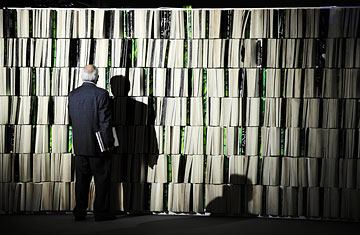
A visitor studies a bookshelf at the Frankfurt Book Fair on Oct. 13, 2009
Dai Qing is hardly the sort of writer whom China wanted to be given a platform at the Frankfurt Book Fair, the largest annual event of its kind. China was the fair's guest of honor this year, and the country's official representatives wanted to showcase a few young, popular novelists. Dai, 68, is a journalist and author of serious works on the environment in China and social affairs like women's rights. Thanks to her vocal criticism of the Three Gorges Dam, Dai can no longer find a publisher in mainland China. Her ideas on social issues in China have earned her a following abroad, but China's culture mavens are not fans.
That became abundantly clear last month during a symposium ahead of the Oct. 14-18 fair, when the Chinese delegation walked out over the participation of Dai and the poet and critic Bei Ling. Under Chinese pressure, the event's organizers initially rescinded the writers' invitations. Dai, who is based in Beijing, said her official plane ticket had been canceled, but she was able to attend the fair as an unofficial guest after obtaining a visa through the sponsorship of the German branch of the PEN writers' association.
A successful 2008 Olympics showed China as a world leader in sport, and the relative strength of the country's economy amid the global financial downturn has given it further economic clout. China's domestic publishing industry has expanded rapidly since economic reforms began in the late 70s, with 270,000 titles published last year, but overseas recognition of this growing body of literature hasn't followed as quickly. Chinese leaders have long worried about China's lack of soft-power influence of the sort that the U.S. and Europe achieve through their prominent roles in media and arts.
China's cultural ministries saw Frankfurt as a way to boost the country's clout overseas. The General Administration of Press and Publication sponsored the translation of more than 100 Chinese books into German and English to be sold at the fair, part of China's $7.5 million investment in the event. The writers who were approved for the official program in Frankfurt included Yu Hua, an author of earthy, sometimes profane novels of human struggle including To Live and Brothers. While Yu's sex- and drug-laden writing could have been banned as late as the 1980s, it now has an official stamp of approval because he avoids overt criticism of Communist Party rule.
It was that sort of relative freedom for Chinese literature that Beijing wanted to emphasize in Frankfurt. The Committee to Protect Journalists says there were 28 journalists in Chinese jails last year, the most of any country. "At the opening of the fair, the Chinese officials spoke of literature flourishing but did not say a word about writers in jail, about censorship or prohibitions," Dai told Deutsche Presse-Agentur (DPA). Dai, however, had plenty to say on the topic, in interviews and at fair-related events. By reacting so vitriolically to her presence — China's former ambassador to Germany Mei Zhaorong said, "We didn't come for a lesson on democracy" — China ensured that the uglier elements of its treatment of journalists and authors would be a focus of the fair. "The media is paying attention to us. We can speak freely," she told DPA.
Juergen Boos, the fair organizer, said he was personally angered by mistakes and compromises in the organization and communication of the pre-fair symposium. In response to Mei's statement that China wouldn't be lectured on democracy, Boos wrote on the fair's website that "the Frankfurt Book Fair is not offering instruction in democracy, to be sure, but it is democracy in action." Soon after, project manager Peter Ripken was fired, apparently for blocking Dai and Bei from speaking at the closing ceremony, Deutsche Welle reported. Ripken responded that he had been acting on instructions from Germany's Foreign Ministry.
The Frankfurt hosts' struggle not to offend the sensitivities of their Chinese guests while not compromising the ideals of the event is a recurring theme across the globe this year, as China pushes for more clout in cultural forums. This summer several Chinese directors pulled out of the Melbourne International Film Festival to protest the screening of a film about Rebiya Kadeer, an exiled activist whom the Chinese government blames for provoking deadly rioting in the northwestern city of Urumqi in July. (Kadeer denies any role in the unrest.) Beijing also criticized the inclusion of the Kadeer documentary The 10 Conditions of Love at a September film festival in Kaohsiung, Taiwan.
